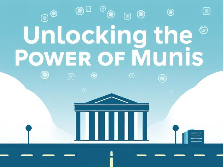
Unlocking the Power of Munis: A Complete Guide to Municipal Bonds in 2025
Municipal bonds, commonly called munis, have long been a favorite among individ investors seeking steady income and tax advantages. As the financial landscape evolves in 2025, understanding munis becomes more essential than ever—whether you’re a seasoned investor or just starting to explore fixed-income options. In this comprehensive guide, we’ll break down what munis are, how they work, their pros and cons, and key tips to incorporate them into your investment strategy.
What Are Munis? An Introduction to Municipal Bonds
Municipal bonds—or munis—are debt securities issued by states, cities, counties, or other local government entities to fund public projects. These projects can range from building highways and schools to financing parks, water systems, and even hospitals. When you buy a muni, you’re essentially lending money to the issuing government in exchange for regular interest payments and the return of your principal at maturity.
How Munis Differ from Other Bonds
Unlike corporate bonds, munis are backed by the taxing power of local governments or specific revenue streams. This distinction often makes munis more appealing for conservative investors, particularly because they tend to be less risky than their corporate counterparts. Moreover, the tax advantages associated with munis are a significant draw, especially for high-income earners seeking to minimize their tax burden.
Types of Munis You Can Invest In
There are primarily two types of municipal bonds:
- General Obligation Bonds (GOs): Backed by the full faith and credit of the issuing authority, GOs are considered very safe because they are supported by tax revenues or other taxing authority.
- Revenue Bonds: These are secured by specific revenue sources, like tolls from a bridge or fees from a water utility. They can carry higher risk but often offer higher yields.
Why Investors Love Munis in 2025
Munis have historically been a staple in many conservative portfolios, and their appeal remains strong in 2025 for several reasons.
Tax Benefits Are More Valuable Than Ever
In recent years, tax policies have become more favorable towards munis, especially under the latest federal tax laws. Many investors benefit from tax-exempt interest income, which can significantly boost after-tax returns—particularly for those in higher tax brackets. For example, a muni yielding 3% might effectively be worth much more to a high-income investor when factoring in federal and state tax savings.
Attractive Yields in a Low-Interest Rate Environment
While interest rates have been fluctuating, the yields on munis have remained relatively attractive compared to other fixed-income securities. This makes munis a compelling choice for those seeking income without taking on excessive risk.
Stability and Risk Profile
Munis tend to be less volatile than stocks and corporate bonds, especially when issued by financially stable municipalities. During economic downturns, the ability of local governments to meet debt obligations remains relatively resilient—though, of course, some risks still exist.
The Risks and Challenges of Investing in Munis
No investment is without risks, and munis are no exception. While they offer many benefits, understanding potential pitfalls is crucial for making informed decisions.
Credit Risk and Default Concerns
Although most munis are considered safe, some local governments face fiscal challenges, economic downturns, or mismanagement that could lead to defaults. Notable defaults in history, like Detroit’s bankruptcy in 2013, remind investors to evaluate the creditworthiness of issuers carefully.
Interest Rate Sensitivity
Munis are sensitive to interest rate changes. When rates rise, bond prices tend to fall, which can impact the value of your holdings if you need to sell before maturity. Conversely, falling rates can increase the value of existing muni bonds.
Tax Policy and Legislative Changes
While current tax advantages are significant, future legislative changes could alter or reduce the tax benefits attached to munis. Staying informed about policy developments is essential for maintaining the value of your investments.
How to Invest in Munis: Strategies and Tips
Investing in munis can be straightforward, but successful investors follow certain strategies to maximize benefits and minimize risks.
Diversify Your Muni Portfolio
Just like any investment, diversification is key. Consider holding bonds from different states, municipalities, and sectors to spread risk. For example, combining bonds from urban centers with those from suburban or rural areas can provide a more balanced exposure.
Focus on Credit Ratings
Pay close attention to credit ratings assigned by agencies like Moody’s, S&P, and Fitch. Higher-rated munis (AAA, AA) tend to be safer but offer lower yields, while lower-rated bonds (BBB and below) might offer higher returns but come with increased risk.
Consider Tax-Equivalent Yield
For investors in high tax brackets, calculating the tax-equivalent yield helps compare muni yields with taxable bonds. The formula is:
Tax-Equivalent Yield = Tax-Free Yield / (1 – Tax Rate)
For example, a 3% tax-free muni yield is equivalent to a higher taxable yield if you’re in a high tax bracket.
Choose Between Bond Funds and Individual Bonds
Investors can opt for municipal bond funds—mutual funds or ETFs—that offer instant diversification and professional management. Alternatively, buying individual munis allows for more control and potentially higher yields if managed carefully.
Stay Updated on Local Economic Conditions
The fiscal health of the issuing municipality directly impacts bond safety. Regularly review local economic reports, budget reports, and credit ratings to stay ahead of potential risks.
The Future of Munis: Trends and Outlook for 2025
As we look ahead, several trends are shaping the muni market in 2025.
Focus on Green and Sustainable Bonds
Environmental concerns are driving a surge in green munis—bonds issued specifically to finance eco-friendly projects like renewable energy, clean water, and sustainable urban development. These bonds attract socially conscious investors and are expected to grow further.
Digital Transformation and Transparency
Technological advancements are improving transparency and liquidity in the muni market. Platforms now provide real-time data, credit analytics, and easier access for retail investors—making munis more accessible than ever.
Rising Demand from Retirement Accounts
With aging populations and increased focus on retirement planning, muni bonds are becoming a staple in 401(k)s and IRAs. Their tax advantages and stability make them well-suited for long-term retirement savings.
Wrapping Up: Are Munis Right for You?
Municipal bonds, or munis, remain a compelling investment option in 2025, especially for those seeking tax-efficient income and lower risk. They offer a way to support local infrastructure while earning interest that might be tax-free—an attractive proposition for many investors.
However, like all investments, munis come with their own set of risks. Conducting thorough research, understanding the credit quality of issuers, and diversifying your holdings are essential steps toward building a resilient muni portfolio. Whether you’re a cautious investor or looking to enhance your income streams, munes can be a valuable part of your financial plan.
Remember, the key to successful investing is staying informed and aligning your choices with your financial goals and risk appetite.
FAQs: Munis Made Simple
Q: Are munis really tax-free everywhere?
A: Not necessarily. The primary tax benefit is federal tax-free income. State and local tax exemptions depend on where you live and where the bond is issued.
Q: Is it safe to buy individual munis?
A: It depends on the issuer’s creditworthiness. High-rated bonds are generally safer, but it’s wise to do your homework or consult with a financial advisor.
Q: Can I lose money investing in munis?
A: Yes, especially if interest rates rise or if an issuer defaults. Proper diversification and due diligence help mitigate these risks.
Q: Should I buy muni bonds or bond funds?
A: Both have pros and cons. Bond funds provide diversification and professional management, while individual bonds can offer higher yields if selected carefully.
Q: How do I start investing in munis?
A: You can buy individual bonds through brokerage accounts or invest in municipal bond funds or ETFs. Consulting a financial advisor can help tailor a strategy to your needs.
Investing in munis in 2025 offers a balanced combination of income, safety, and tax benefits. With the right approach and ongoing research, munis can be a valuable component of your investment journey—helping you achieve financial stability while supporting community development.





